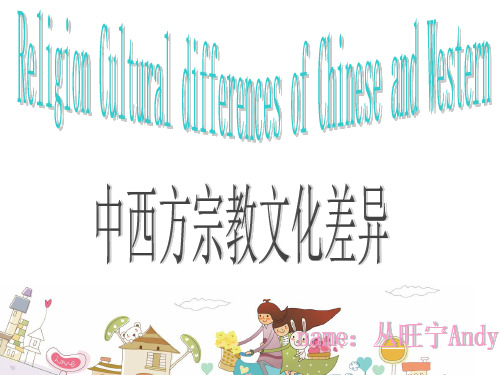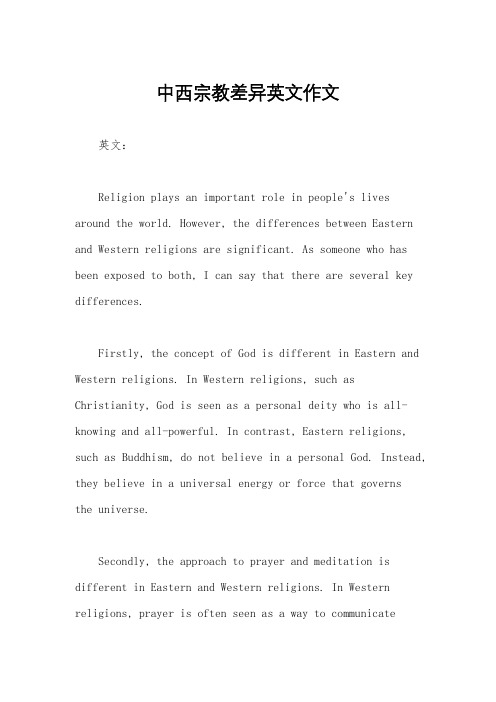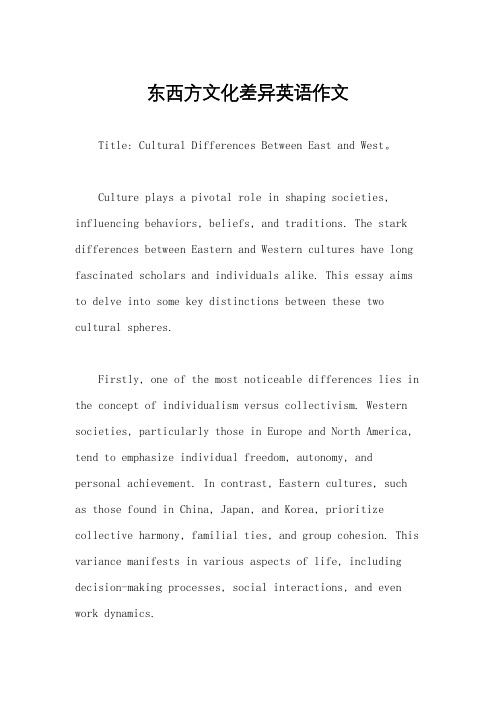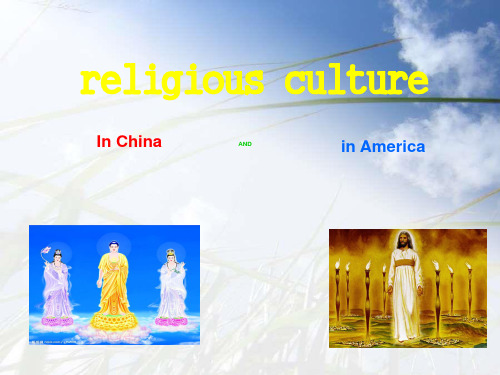东西方宗教文化差异(英文版)
中西方宗教文化差异 (英文)

*Food taboo more Islam, the main is not eating unclean, which
include pork, dog meat, flesh of a donkey, horse meat, rabbit meat, fish without scales and animal blood and non imams killed animal and the dead animal, it also prohibits the drinking 伊斯兰教的饮食禁忌较多,主要是不食不洁之物,这包括猪肉、狗肉、 驴肉、马肉、兔肉、无鳞鱼及动物的血和非阿訇宰杀的动物和自死的 动物,同时还禁止饮酒。
Taoism
伊斯兰教Islam
Islam is one of the world's religions. The rise in the seventh Century ad in Arabia peninsula. 伊斯兰教是世界性宗教之一。兴起于 公元7世纪的阿拉伯半岛 。 China formerly called Dashi Dashi method, teach, teach, Arabian Muslim, Hui Muslim teaching, etc.. 中国旧时称大食法、大食教度、天方 教、清真教、回教 等。 Muslim people collectively Muslim (Muslim, meaning the conformist).信 奉伊斯兰教的人统称穆斯林(Muslim 意为顺从者)。 Islam is the classic "the Koran". The characteristics of Islam is peace, love, self-improvement.伊斯兰教的 经典是《古兰经》。伊斯兰教的特点 是和平、仁爱、自强不息。
中西宗教差异英文作文

中西宗教差异英文作文英文:Religion plays an important role in people's lives around the world. However, the differences between Eastern and Western religions are significant. As someone who has been exposed to both, I can say that there are several key differences.Firstly, the concept of God is different in Eastern and Western religions. In Western religions, such as Christianity, God is seen as a personal deity who is all-knowing and all-powerful. In contrast, Eastern religions, such as Buddhism, do not believe in a personal God. Instead, they believe in a universal energy or force that governsthe universe.Secondly, the approach to prayer and meditation is different in Eastern and Western religions. In Western religions, prayer is often seen as a way to communicatewith God and ask for guidance or blessings. In contrast, meditation is more commonly practiced in Eastern religions as a way to quiet the mind and achieve inner peace.Thirdly, the role of the individual is different in Eastern and Western religions. In Western religions, individuals are often seen as separate from God and in need of salvation. In contrast, Eastern religions emphasize the interconnectedness of all beings and the importance of achieving enlightenment or liberation from suffering.In terms of examples, one can look at the differences between Christmas and the Chinese New Year. Christmas is a Christian holiday that celebrates the birth of Jesus Christ, while the Chinese New Year is a celebration of the lunar new year and is rooted in Chinese traditions and beliefs. Another example is the difference between the Western concept of heaven and the Eastern concept of reincarnation.中文:宗教在全世界的人们生活中扮演着重要的角色。
Cultural-Differences-between-East-and-West--东西方文化差异--英语作文

Cultural Differences between the East and WestAs we all know, the culture in the east and that in the west are very different.In value judgment, easterners hold the value of collectivism while westerners hold the values of individualism. As the way of thinking, western people think more directly, but the eastern people more obliquely. So while solve a problem, westerners would solve it in a quite direct way while easterners would more likely to detour. Meanwhile, easterners would show their emotions and opinion in a more tactful way than westerners who show then out directly. And for mode of life, westerners prefer live by their own while easterners prefer live in groups. When talking about interpersonal relationship, westerners have much more simply interpersonal relationship than easterners. There are still many different aspects in the culture between the east and the west. And among all these, the value of judgment is one of the most obvious and important differences.It is known that easterners hold the value of collectivism while westerners the values of individualism. That is to say, in east, one should put collective interests in the first place. That is because they believe one would not exist without nationality, society, family or other collective; so one is firstly a person in collectives, and then he is himself. Therefore, the view of oneself in the east is tiny. However, in west, one would usually pay more attention to the realization of personal interests, because in their mind, the societies are established on individual. So, unlike eastern countries, theview of self is great in western countries.In the past years, millions of people argue that the collectivism and individualism which one is better. They all had their own points, and as for me, they are all reasonable. In one hand, any one of us is living in the collective, on one can live without collective; and as a member of a collective, it is reasonable and necessary to attach importance to the congregate interests. But it does not necessary mean that we should give up all our rational interests, we still have the rights to pursue them. Only when our own interest against the congregate one, should we put the congregate one in the first place. In the other hand, it is right for the individualism stress the expression of individuality, independence, liberty, competition, and self-achievement.A society should admit individual value, so that, the whole society could exert its vitality absolutely. In a word, from my point of view, these two types of value are all meaningful and have their own pros.There are many differences between east and west. Different cultures add a colorful element to the world. The cultural gap should not be the obstacle to the civilization of human being. It ought to be the motivation of our going farther. Besides, we can not judge which type of culture is better in our own point of view, because all culture exits in its meaningful way: they formed, developed and exited in a specific culture and social environment.。
东西方文化差异英语作文

东西方文化差异英语作文Title: Cultural Differences Between East and West。
Culture plays a pivotal role in shaping societies, influencing behaviors, beliefs, and traditions. The stark differences between Eastern and Western cultures have long fascinated scholars and individuals alike. This essay aims to delve into some key distinctions between these two cultural spheres.Firstly, one of the most noticeable differences lies in the concept of individualism versus collectivism. Western societies, particularly those in Europe and North America, tend to emphasize individual freedom, autonomy, and personal achievement. In contrast, Eastern cultures, such as those found in China, Japan, and Korea, prioritize collective harmony, familial ties, and group cohesion. This variance manifests in various aspects of life, including decision-making processes, social interactions, and even work dynamics.For instance, in Western cultures, individuals are encouraged to express their opinions, pursue personal goals, and assert their independence. This emphasis onindividualism can be observed in educational settings,where students are encouraged to think critically,challenge authority, and showcase their unique talents. Moreover, in professional environments, employees often strive for personal recognition, career advancement, and individual success.Conversely, Eastern cultures value conformity, humility, and maintaining social harmony. In educational settings, students are expected to respect authority, cooperate with peers, and prioritize the collective good over individual achievements. Similarly, in the workplace, teamwork,loyalty to the organization, and consensus-building are highly valued traits. The hierarchical structure prevalentin many Eastern societies reinforces the importance of deference to authority and adherence to traditional norms.Another notable distinction is the perception of time.Western cultures typically adhere to a linear view of time, where schedules are meticulously planned, and punctuality is highly valued. Time is often equated with money, and efficiency is prioritized in various facets of life, including work, education, and social engagements.On the contrary, Eastern cultures often adopt a more cyclical view of time, where events unfold organically, and the emphasis is placed on the present moment rather than strict adherence to schedules. This can be observed in cultural practices such as tea ceremonies in Japan or leisurely family gatherings in China, where the focus is on savoring the moment rather than rushing through it.Moreover, communication styles vary significantly between Eastern and Western cultures. Western communication tends to be direct, explicit, and assertive, with individuals encouraged to speak their minds openly and express their opinions freely. This directness is valuedfor its clarity and efficiency in conveying information and resolving conflicts.In contrast, Eastern communication is often characterized by indirectness, implicitness, and the use of context cues. Silence, nonverbal cues, and subtle gestures play crucial roles in conveying messages, maintaining harmony, and preserving interpersonal relationships. Additionally, saving face and avoiding confrontation are paramount in many Eastern cultures, leading to a preference for diplomacy and tactful communication strategies.Furthermore, the perception of authority and leadership differs between East and West. Western societies tend to favor democratic leadership styles that prioritize equality, participatory decision-making, and individual empowerment. Leaders are expected to consult with their subordinates, solicit feedback, and foster a sense of inclusivity within the organization.In contrast, Eastern cultures often value hierarchical leadership structures, where authority is centralized, and obedience to superiors is emphasized. Leaders are reveredfor their wisdom, experience, and benevolence, and subordinates are expected to defer to their judgmentwithout question. This hierarchical approach fosters stability, order, and respect for authority within organizations and society at large.In conclusion, while both Eastern and Western cultures share common human values and aspirations, their approaches to various aspects of life diverge significantly. Understanding these cultural differences is crucial for fostering mutual respect, cross-cultural communication, and global cooperation in an increasingly interconnected world. By appreciating and embracing the richness of diversity, we can bridge the gap between East and West and cultivate a more harmonious and inclusive global community.。
东西方文化差异(英文) PPT

BY 李 鑫(Li Xin)
There exists many basic differences between Eastern and Western culture,such as time conscious,way of dealing with difficulties,human relations,lifestyles,diet habits and so on. 中外文化方面存在着很多本质的差异,比如时间观念、处理困难
The development of architecture:Chinese construction is Conservative ,and the west building often change their structure and materials rapidly.
Difference between Western and Eastern in wedding
SLAM DUNK (灌篮高手)(日本)
Detective Conan (名侦探柯南)(日本)
Tom and Jerry (猫和老鼠)(美国)
The Lion King(狮子王)(美国)
图示_03
Time Conscious(时间观念) In western,it is very punctual
图示_03
Queue up(排队) Westerns:order Chinese:disorder
图示_03
Leader position(领导地位) Westerners:equal Chinese:top
图示_03
The life of old age(晚年生活) Westerners:living with pets Chinese:living with children
中西方宗教文化差异

中西方宗教文化差异Cultural Differences between Eastern and Western ReligionsReligion plays a significant role in shaping the culture of a society. It influences the way people think, behave, and perceive the world around them. The Eastern and Western hemispheres have distinct cultural differences, and so do their religious beliefs and practices. This essay aims to highlight the major disparities between Eastern and Western religions, focusing on key aspects such as belief systems, rituals, and values.One of the fundamental differences between Eastern and Western religions lies in their belief systems. Eastern religions, such as Hinduism and Buddhism, are often characterized by a belief in reincarnation and karma. Followers believe in the cycle of birth, life, death, and rebirth, with the ultimate goal of attaining enlightenment and liberation from this cycle. In contrast, Western religions, like Christianity and Islam, focus on the belief in a single life on earth, with the promise of an afterlife, either in heaven or hell, based on individual actions and faith.In conclusion, the cultural differences between Eastern and Western religions are significant and permeate various aspects of society. The disparities in belief systems, rituals, values, and the role of religious authorities contribute to thedistinctiveness of each religious tradition. Understanding these differences is crucial in promoting intercultural dialogue, fostering mutual respect, and appreciating the diversity of religious beliefs and practices in our globalized world.。
中西文化差异英文版

Differences in food
Chinese food and western food
In China, we prefer noodles, rice , dumpling as the main course.
We like cooking a lot of delicious dishes, then we set up the tables, put the dishes on the tables, sit together, and taste the dishes together, we don’t eat with individual plates, when we eating ,we like chatting and laughing, we think it’s warm and happy to eat this way;
• An western hostess is likely to say,” Oh, I am so glad that you liked it. I cook it especially for you.”
Differences in thinking
THANKS
culture is the biggest festival, food,
one.
wedding and so
on.Now I want to
introduce
something about
it.
Differences in Festival
Christmas Day
the Spring Festival
Culture differences between China and western
中美宗教文化比较(英文版)

Harvard University
Yale University
Princeton University
the effects of religion on American movies
• A common phenomenon we always see in the American movie is that the hero often considers himself as a savior. So as the country. The United States often invade other countries in the name of helping and improving. All of these come from their religion, Puritanism(清教主 义). Furthermore, it contributed to the hegemony (霸权主义)of the United States to some degree.
Various American presidents have often stated the importance of religion. On 20 February 1955, President Dwight D. Eisenhower stated that "Recognition of the Supreme Being is the first, the most basic, expression of Americanism." President Gerald Ford agreed with and repeated this statement in 1974.
- 1、下载文档前请自行甄别文档内容的完整性,平台不提供额外的编辑、内容补充、找答案等附加服务。
- 2、"仅部分预览"的文档,不可在线预览部分如存在完整性等问题,可反馈申请退款(可完整预览的文档不适用该条件!)。
- 3、如文档侵犯您的权益,请联系客服反馈,我们会尽快为您处理(人工客服工作时间:9:00-18:30)。
Where the beauty of world is the difference and diversity, cultural differences are no exception. 在世界的美是差异性和多样性,文化差异也不例外。 West is theism, believe in God, believe in God, everyone is God's people, everyone is equal before God. Faith is the most powerful spiritual support. It guided the direction of life, to give the necessary spiritual comfort. Science developed capitalist countries, many religious people and even its leaders want God bless. 西方是有神论,相信上帝,相信上帝,每个人都是上帝 的人,上帝面前人人平等。信仰是最强大的精神支持。它 指引着人生的方向,给予必要的精神安慰。科学发达的资 本主义国家,很多有宗教信仰的人甚至其领导人希望上帝 保佑。
西方的宗教主要有:伊斯兰教、基督教。和佛教相近,伊斯 兰教在麦加,默罕默德创立,经历了血腥风雨。基督教产生 于公元一世纪,创立者耶稣,基督教更是血腥,耶稣受难, 严厉的刑罚都极其的残忍。
original sin is the foundation of Christian theory and practice . Because human ancestors, Adam and eva had sinned, corrupt moral invaded their body, and Transmitted to their descendants, the result is men are guilty, all mankind have sin. because of this people are bound to die, and will were punished in all their life. We can see from the original sin all things of Christianity are classified into two worlds: the human world and God’s world. Person’s world is a world separated from God, and human’s world depends on God’s world, so everything is the communication between the two worlds and its results. Obviously, Christianity preached that man and God, the separation of man and nature. While Chinese religion would emphasize that the harmony between man and nature, issues of life within a confined themselves, to solve problems with peopleoriented. 原罪是基督教的理论与实践基础。因为人类的祖先,亚当和伊娃都是 有罪的,败坏道德的侵入他们的身体,并传送到他们的后代,其结果 是人是有罪的,所有人类的罪。因为这个人是会死的,会是一生的惩 罚。我们可以看到从原罪一切基督教分为两个世界:人类世界和神的 世界。人的世界是一个世界与神分离,与人的世界依赖于神的世界, 所以一切都是两个世界和它的结果之间的通信。显然,基督教宣扬, 神与人,人与自然的分离。而中国的宗教则强调人与自然的和谐,在 一个封闭的自己的生活问题,解决问题的人的。
Байду номын сангаас
Western religion are: Islam, christianity. Similar and Buddhism, Islam in Mecca, Mohammed founded, has experienced the bloody storm. Christianity in the first Century ad, founder of Jesus, the Christian is bloody, the crucifixion of Jesus, severe penalties are extremely cruel.
China's religious has given people great freedom, so that people can hold religious sentiment in their hearts. Therefore, the God most Chinese people worship is not uniform. Most Chinese people do not belong to a religious organization, however, are more or less exist a unified spirit from Confucianism Buddhism and Taoism. The religious traditions in China, Confucianism has constituted the soul of Chinese culture in the long course of historical development. Many thinkers and politicians in China are based on the Confucian sense of responsibility to pursue truth, to maintain the orthodox and the implementation of reforms. 中国的宗教给了人们极大的自由,使人们可以握在自己心中的宗教情 怀。因此,中国人最崇拜的神是不均匀的。大多数中国人不属于一个 宗教组织,但是,都或多或少地存在着一个统一的精神从儒、道。在 中国的宗教传统,儒学构成了在长期的历史发展过程中中国文化的灵 魂。在中国的许多思想家和政治家都是基于儒家的责任感,追求真理, 维护正统和推行改革。
On the other hand, in addition to Confucianism, Buddhism and Taoism, the Chinese folk religion and worship of God is also very much prosperity and universal, various gods are the object that believers worship incense. the strong contrast between the conceptual life and practical life resulted in the loss of religious values and alienation in China, and also led to the emergence and spread of a variety of primitive superstitious beliefs and event. It caused abnormal development of the spiritual life, so that a heavy burden put on the reality of Chinese culture, many people have a spiritual emptiness 另一方面,除了儒学,佛教和道教,中国民间信仰和崇拜的神也是非 常繁荣和普遍的,各种各样的神,信徒拜佛烧香的对象。概念生活和 现实生活之间的强烈反差导致在中国宗教价值和异化的损失,而且 LED的各种原始的迷信观念和事件的产生和传播。它造成的精神生活 的畸形发展,这样一个沉重的负担放在中国文化的现实,很多人有一 种精神上的空虚
China is atheist, does not believe in God, but some people believe in ghosts, some people believe in Confucianism or Taoism. The people who believe in God love God, and hope the gods appear to bless them. But the people who believe in ghosts are afraid of ghosts, hope them do not to endanger themselves and their families, but also don’t pray for his protection. Those who believe in God believe in God's oversight and protection of self-restraint, they go to church every week in order to get the gods care. Those who believe in ghosts don’t have supervision and protection of God, selfdiscipline is poor, they need power to constrain, they don’t pray every day. 中国是无神论者,不相信上帝,但是有些人相信鬼,有些人相信儒 家或道家。人们相信上帝,爱上帝,并希望上帝似乎为他们祝福。但 人信鬼怕鬼,希望他们不要对自己和家人的危害,也不求他保护。那 些相信上帝,相信上帝的监督和保护的自我约束,他们就以每星期获 得神关心教会。那些相信鬼怪没有神的监督和保护,行业自律性差, 他们需要权力制约,他们不每天祈祷。
